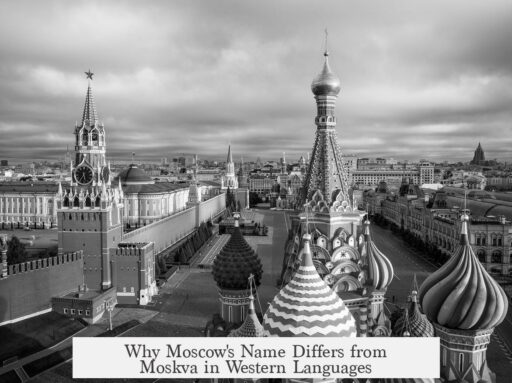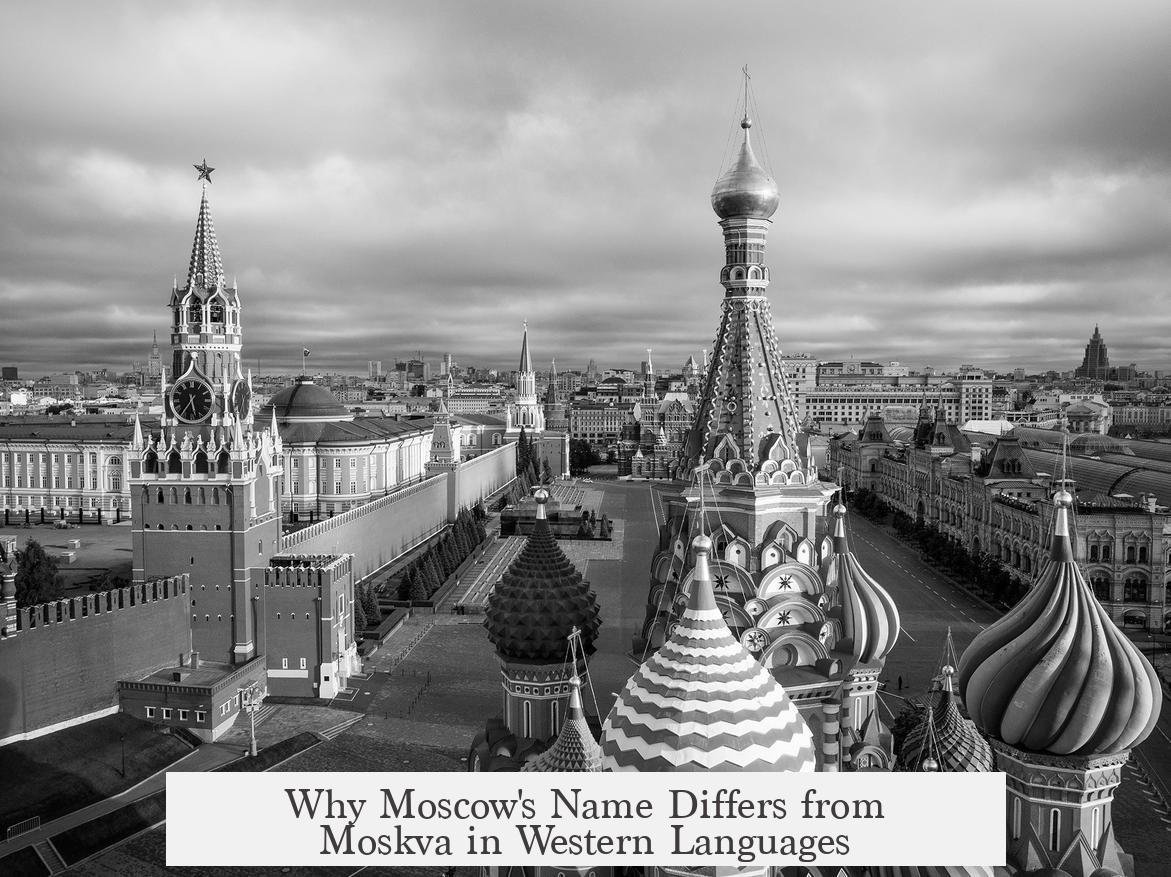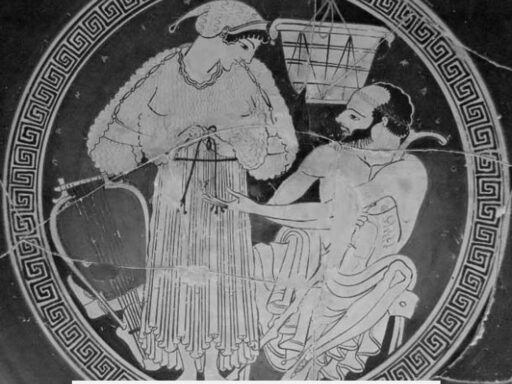Moscow is called “Moscow” instead of “Moskva” in the West due to historical linguistic developments, early Western transliterations, and evolving language interactions dating back to medieval times.
The name “Moscow” traces back to the Old East Slavic term Московь, pronounced roughly as [moskov’]. This form directly influenced early Western renderings. In West Slavic and Germanic languages, the ending “-ov” was commonly transliterated with an “-ow” or “-au” sound. Thus, early Western names like “Muscovy” for the medieval principality and “Muscovite” for its people derive from this older form.
During the late Middle Ages, Slavic languages underwent significant vowel shifts, particularly involving the “jer” vowels. These jers were short, fading vowels that originally helped form consonant clusters such as the “-skv-” in Moscow’s name. When jers gradually ceased to be pronounced, language rules adapted by inserting full vowels in their place. This process caused fluctuations in vowel presence inside words.
In Moscow’s case, this meant the fleeting vowel changed depending on grammatical case: for example, the nominative form was “Moskov’” (Московь) while in other cases like the locative it shifted to “Moskva” (на Москве or на Москве). The modern Russian spelling Москва/Moskva emerged in the 14th century, after extensive trade relations and contacts with Western nations developed.
The city was already prominent by the time Italian architects built many Kremlin buildings in the late 15th century. Foreigners encountering Moscow adapted the name into their own phonetic and orthographic systems. Consequently, Western variations such as Moskau (German), Moscou (French), Mosca (Italian), and finally Moscow (English) became standard.
This trend parallels changes in other Slavic city names adopted by the West. For example, Киев (Kyiv) retains its form in Russian, but Western languages historically used “Kieff.” Similarly, Warszawa becomes Warsaw or Warschau, Łódź is rendered as Lodz, and Szczecin changes to Stettin. Saint Petersburg’s name fully adopts an English form due to its international significance and wide foreign population.
Moscow’s long history combined with deep foreign ties accelerated its Westernized naming. Many other major Russian cities are relatively younger and lacked significant early Western contact, limiting similar name adaptations. Cities founded much later, such as Yekaterinburg and Novosibirsk, retain Russian pronunciations more consistently in foreign languages.
| Aspect | Explanation |
|---|---|
| Old East Slavic Root | Московь [Moskov’] formed original basis of Western names, transliterated as “-ow”. |
| Vowel Shifts | Fading jers led to vowel changes; Moskov’ and Moskva forms coexisted grammatically. |
| 14th Century Russian Spelling | Modern Москва emerges post early foreign trade and interaction. |
| Western Adaptations | Foreign languages adapted name as Moskau, Moscou, Mosca, Moscow to fit phonetics. |
| Comparable City Names | Similar Westernized versions for Warszawa, Киев, Санкт-Петербург, etc. |
| City Age and Contact | Moscow’s early prominence and foreign relations influenced Western name adoption. |
This linguistic evolution explains why the Western world uses “Moscow” rather than “Moskva,” despite the modern Russian pronunciation. The name reflects historical transliteration conventions, language changes in Slavic vowel pronunciation, and the city’s long-standing foreign connections.
- The original East Slavic name was closer to “Moskov’,” influencing early Western forms.
- Vowel shifts due to jer vowels changed Russian from Moskov to Moskva over time.
- The Moscow spelling appeared centuries after Western contact began.
- Western languages adapted the city’s name to fit their phonetics and writing styles.
- Similar patterns occur in other Slavic city names with Western variants.
- Moscow’s age and status led to early and broad foreign adoption of “Moscow.”
Why Is Moscow Called Moscow Instead of Moskva in the West?
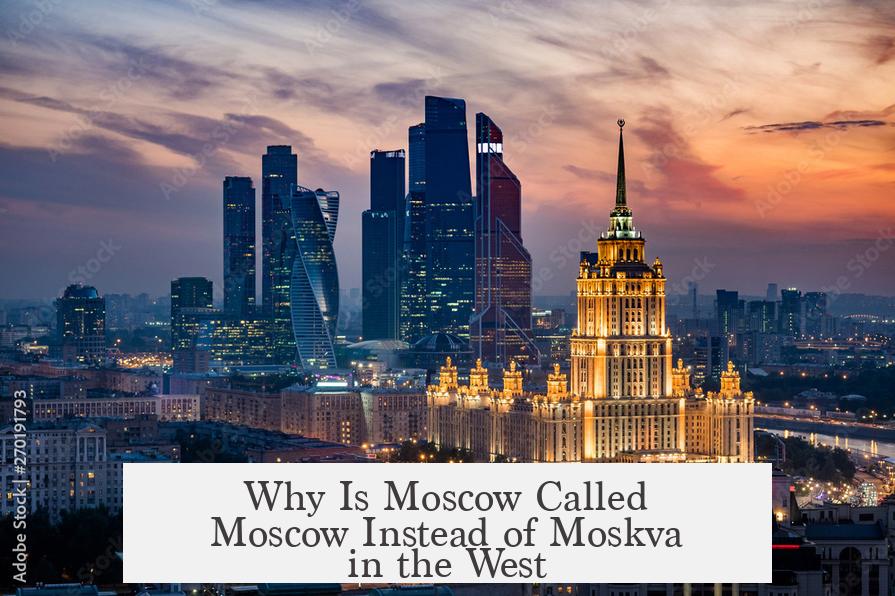
The reason the West calls the Russian capital “Moscow” rather than the Russian “Moskva” boils down to history, language twists, and old trade routes that frozen the name in time as it sounded centuries ago. This story involves shifting vowels, medieval scribes, and a bit of international diplomacy. Let’s unpack this fascinating journey of a city’s name!
To fully appreciate why the English-speaking world didn’t adopt the local “Moskva,” it’s important to dive into the linguistic and historical past of the name itself. Buckle up—this isn’t just a boring tale of phonetics; it’s a linguistic adventure!
The Roots Lie in Old East Slavic
The oldest form of Moscow’s name comes from the Old East Slavic word Московь (pronounced roughly “Moskov’”). This spelling—and sound—played a key role in how Western languages would eventually treat the name.
Back in the 12th century, early Russian texts like the Lavrentian Primary Chronicle used this Moskov’ form, with an “-ov” ending. Here’s an interesting tidbit: West Slavic and Germanic languages often transliterate this “-ov” ending as “-ow,” which explains why you see versions like “Muscovy” (the medieval Russian principality) and “Muscovite” (someone from Moscow) in Western texts.
So when Western traders and diplomats first recorded the city’s name, they did so using this older version. The “Moscow” we know is a linguistic heir of “Moskov'” via several Germanic and West Slavic translations, not the modern Russian “Москва” (Moskva).
Language Evolution and Vowel Shifts—The Jer Magic
Languages never stay still, especially Slavic ones during the Middle Ages. In Russian, vowel sounds began to shift dramatically, largely influenced by a phenomenon called the Jer shift. You might ask, “What on earth is a Jer?”
Jers were tiny, fleeting vowels appearing in speech, especially at the ends of words or hidden within consonant clusters. They eventually disappeared in pronunciation, pushing language to “fill in the gaps” with new vowels. This shift changed “Moskov” into “Moskva” in Russian-speaking areas.
This fleeting or “switching” vowel means that in some grammatical cases, Russians say “Moskov’,” while in others, “Moskva”—grammatical nuances that confuse even native speakers sometimes! For example, when saying “in Moscow,” Russians say “на Москве” (na Moskvi), showing the vowel ‘o’ disappearing in certain contexts.
So, the modern Russians hear and say “Moskva,” reflecting these sound changes. Meanwhile, Western languages had already locked in “Moscow” from the older Moskov’ before these shifts took hold.
Western Interaction Cemented the Older Form
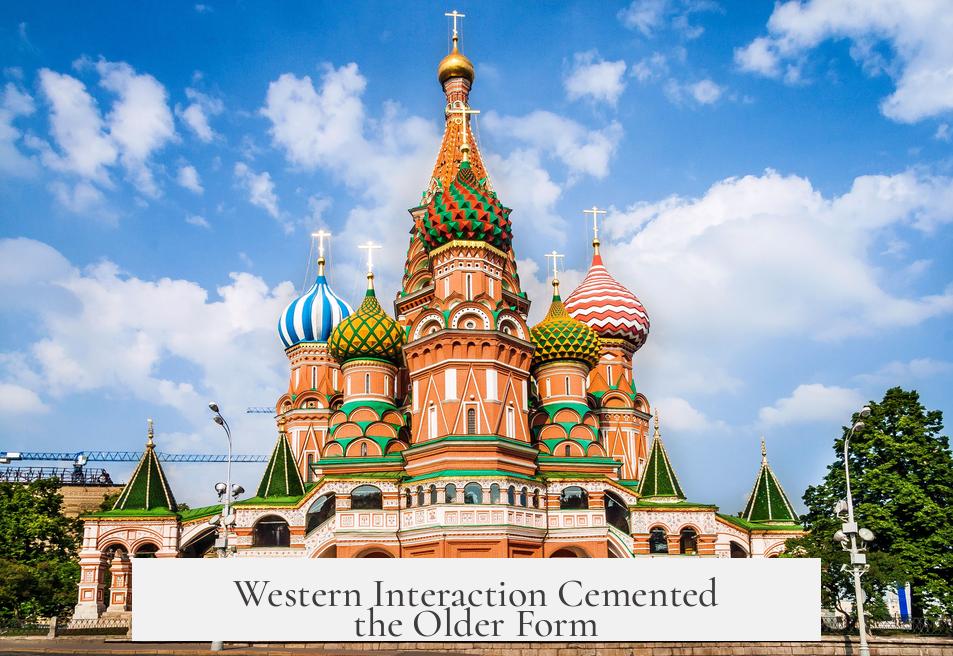
The spelling московь, and the Moskov’ pronunciation, stuck in Western minds because they encountered it during the 14th century, when Moscow’s name started appearing in documents and trade letters.
By then, Muscovite princes and merchants had heavy trade ties with Western Europe. Italian architects even helped build the Kremlin’s walls in the late 15th century!
This international contact meant Western Europeans wrote down the city’s name using forms they could easily pronounce: “Moskau” in German, “Moscou” in French, “Mosca” in Italian and Spanish, and eventually “Moscow” in English.
These versions reflect the older East Slavic form Moskov’, rather than the newer Russian Moscow (Москва). The West essentially “froze” the name in an earlier linguistic snapshot.
Other City Names Show Similar Patterns
Curious if this happens elsewhere? Absolutely. Other Slavic cities show Western versions that differ from native pronunciation.
- Kiev keeps closer to its original Ukrainian “Київ” but was historically rendered “Kieff” in English.
- Warszawa becomes “Warsaw” in English, “Warschau” in German. Quite the makeover!
- Łódź turns into “Lodz” and Санкт-Петербург transforms to “Saint Petersburg” — reflecting foreign influence.
These examples prove how city names adapt to local phonetics, politics, and history. Moscow’s “frozen” form follows this universal pattern.
Why Didn’t Westerners Update the Name to Moskva?
Good question! Moscow’s name entered Western usage early and became standard before the vowel shifts finished. It was too deeply rooted to change later when Russians themselves shifted from Moskov’ to Moskva.
Also, Moscow’s ancient standing and extensive foreign ties mean it had more exposure in older forms, unlike newer cities founded in the 18th and 19th centuries like Екатеринбург or Новосибирск, whose names sound closer internationally to local forms because they met Western ears later and less often.
So, Moscow’s name came pre-packaged for Western tongues long before the Russian language had fully finished evolving it into Moskva.
What Does This Mean for You? A Takeaway

Next time you say “Moscow,” remember you’re channeling medieval traders and scribes who translated an ancient word through lenses of their own language. This name carries centuries of cultural exchange, linguistic quirks, and historical twists.
If you want to impress at a trivia night, mention the Jer shift and fleeting vowels! Or explain how Moscow’s name is a time capsule in Western languages.
And if you’re a traveler, think of “Moscow” and “Moskva” as two faces of the same city—one spoken by locals, one spoken by the world around them.
Summary Table for Quick Reference
| Factor | Why Moscow Instead of Moskva? |
|---|---|
| Old East Slavic Roots | Original form Московь (Moskov’) with -ov/-ow suffix used by early Western traders |
| Language Evolution | Russian vowel shifts (Jer shift) changed Moskov’ to Moskva; Western languages kept older form |
| Western Interaction | Medieval trade and diplomatic ties fixed Moskov’-derived forms in European languages |
| Similar Cases | Other Slavic cities adapted differently by Western tongues, e.g., Warsaw, Kiev, St. Petersburg |
| City Age & Influence | Moscow’s early importance and long Western exposure cemented its Western name |
In the end, Moscow’s name in the West is a linguistic fossil, preserved just like an ancient relic. It reminds us that names often carry deep histories shaped by contact, culture, and language change—not simply phonetic accuracy.
Isn’t language wonderful? And name evolution even more so?
